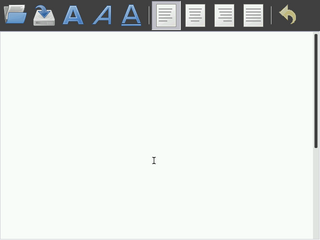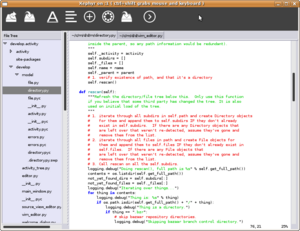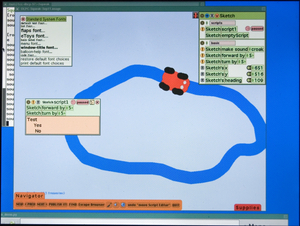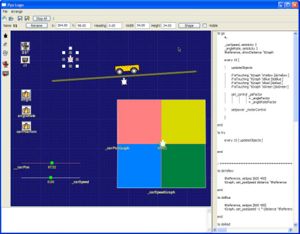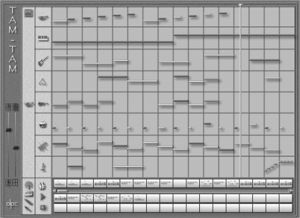Software projects: Difference between revisions
(added memory activity) |
(added pyologo) |
||
| Line 51: | Line 51: | ||
DEV: http://dev.laptop.org/git.do?p=projects/memorygame;a=summary |
DEV: http://dev.laptop.org/git.do?p=projects/memorygame;a=summary |
||
== PyoLogo == |
|||
[[Image:screenshot01.jpg|thumb|PyoLogo snapshot]] |
|||
[[PyoLogo]] [pie-o-logo] or '''PYthon Open Logo''' is an implementation of the [[LOGO]] programing language created on top of [[Python]]. It grew out of [http://www.media.mit.edu/~arnans/ Arnan (Roger) Sipitakiat's] thesis project at the MIT Media Laboratory. [[PyoLogo]] consists of a casual Logo interpreter and a simple IDE. |
|||
DEV: -- will be made available soon -- |
|||
== Tam-Tam == |
== Tam-Tam == |
||
Revision as of 17:08, 19 February 2007
| Projects and proposals +/- | |
| Content ideas | Content projects |
| Hardware ideas | Hardware projects |
| Software ideas | Software projects |
AbiWord
![]() AbiWord is an Open Source word processor that uses GTK as its GUI.
AbiWord is an Open Source word processor that uses GTK as its GUI.
The current focus is on a browser-based Abiword [1].
The AbiWord project has financed an AbiWord Summer of Code project to produce a version with a user interface tailored to the OLPC hardware and the typical OLPC user. The following is the outcome of that project:
What's been done...
- AbiWord runs in the sugar shell
- It has a minimal interface with a custom toolbar
- A new clipart toolbar has been implemented that lets kids drag and drop pictures into their documents
- Made Abiword be embeddable as a Firefox widget
What's left to do...
- Polish (make clipart bar look nicer, have it look for clipart somewhere intelligently)
- Finish implementing table menu button
- Integrate AbiCollab with Sugar shell
- Use clipart bar to add drawings drawing app
- Integrate the work being done on the Journal activity with Abiword applicable.
DEV: http://dev.laptop.org/git.do?p=projects/abiword-olpc;a=summary (olpc) DEV: http://dev.laptop.org/git.do?p=projects/abiword-embed;a=summary (embed) READ: http://www.snowedin.net/ideas/AbiWord+on+OLPC READ: http://www.snowedin.net/summerofcode/
Develop
The Develop Activity is the "Activity for making Activities" in Sugar. In the spirit of Constructivism, OLPC needs a collaborative, intuitive and simple mechanism for fledgling hackers to write software in the same class as the officially supplied activities. It needs to be accessible for both educators who need implement a solid early computer science curriculum and young people who simply wish to play with their computer to make things for making's sake.
DEV: http://dev.laptop.org/git.do?p=projects/develop-activity;a=summary
Etoys
![]() Etoys developed in Squeak was inspired by LOGO, PARC-Smalltalk, Hypercard, and starLOGO. It is a media-rich authoring environment with a simple powerful scripted object model for many kinds of objects created by end-users that runs on many platforms, and is free and open source. It includes 2D and 3D graphics, images, text, particles, presentations, web-pages, videos, sound and MIDI, etc. It includes the ability to share desktops with other Etoy users in real-time, so many forms of immersive mentoring and play can be done over the Internet. It is multilingual, runs on more than 20 platforms bit-identically, and has been successfully used in USA, Europe, South America (Brazil, Colombia, Argentina), Asia (Japan, Korea, India, Nepal), and elsewhere.
Etoys developed in Squeak was inspired by LOGO, PARC-Smalltalk, Hypercard, and starLOGO. It is a media-rich authoring environment with a simple powerful scripted object model for many kinds of objects created by end-users that runs on many platforms, and is free and open source. It includes 2D and 3D graphics, images, text, particles, presentations, web-pages, videos, sound and MIDI, etc. It includes the ability to share desktops with other Etoy users in real-time, so many forms of immersive mentoring and play can be done over the Internet. It is multilingual, runs on more than 20 platforms bit-identically, and has been successfully used in USA, Europe, South America (Brazil, Colombia, Argentina), Asia (Japan, Korea, India, Nepal), and elsewhere.
DEV: http://dev.laptop.org/git.do?p=projects/etoys;a=summary LIST: http://mailman.laptop.org/mailman/listinfo/etoys READ: http://www.squeakland.org/school/HTML/essays/essays.html
Memory
![]() Memory is a musical memory game written in CSound that exploits the mesh network.
Memory is a musical memory game written in CSound that exploits the mesh network.
DEV: http://dev.laptop.org/git.do?p=projects/memorygame;a=summary
PyoLogo
PyoLogo [pie-o-logo] or PYthon Open Logo is an implementation of the LOGO programing language created on top of Python. It grew out of Arnan (Roger) Sipitakiat's thesis project at the MIT Media Laboratory. PyoLogo consists of a casual Logo interpreter and a simple IDE.
DEV: -- will be made available soon --
Tam-Tam
![]() Music is often described as the purest form of mathematical representation, driven instinctively by the human mind. It connects between people in many ways, and offers ways for expressing non-verbal emotion. In that sense music is related to problem-solving and communication.
Music is often described as the purest form of mathematical representation, driven instinctively by the human mind. It connects between people in many ways, and offers ways for expressing non-verbal emotion. In that sense music is related to problem-solving and communication.
On a more practical level, TamTam helps explore and explain ideas connected with sequences, fractions, repetition, transposition, and representation, all of which are helpful for an intuitive understanding of mathematics and many aspects of scientific enquiry. In the realm of applied physics, TamTam proposes tools to explore the phenomenon of sound and show how the manipulation of physical quantities have a direct effect on what is heard. A child's first physics lab starts with making sounds.
DEV: http://dev.laptop.org/git.do?p=projects/tamtam;a=summary Also: CSound - the engine used by TamTam
Wikidpad
Wikidpad is an open source wiki written in Python using wxWindows (officially known as wxWidgets. The main Wikidpad page offers Windows binaries as well as the Python source code to download. Wikidpad uses a backend SQL database to store the pages. Two supported datastores are the pure Python Gadfly which will run on the OLPC, and SQLite, a lightweight SQL database that is simple to integrate into standalone applications. SQLite is also part of the standard library in Python 2.5 which is the basis for the OLPC's Sugar environment.
